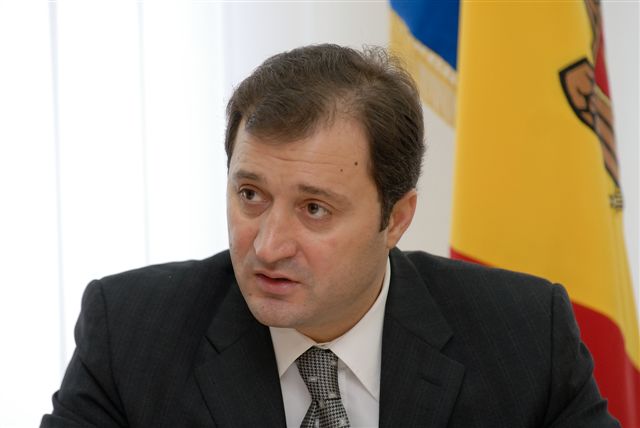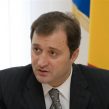
Moldovan Prime Minister Filat Reaches Out to Putin
Publication: Eurasia Daily Monitor Volume: 6 Issue: 219
By:

Moldova’s simultaneous crises –economic and constitutional– have opened a door for Russia to influence politics in Chisinau and arbitrate the power struggles there. The dual crisis, ongoing since early spring, has deepened after two inconclusive parliamentary elections, four failed attempts to elect the head of state in parliament, and a drastic fall in budget and remittance revenues.
At present, Russia is actively inserting itself into the Moldovan crisis, offering good offices and seeking allies of convenience. Russia’s top officials participate in this effort, far outweighing Western representatives by sheer rank.
Russian Prime Minister Vladimir Putin held substantive talks with Moldovan Prime Minister Vlad Filat during the meeting of CIS countries’ heads of government in Yalta on November 20. Filat offered to “open a new chapter in Moldova-Russia relations.” He criticized former president (2001-2009) Vladimir Voronin for having misled Russia with “empty promises that Voronin refused to implement,” seemingly suggesting that he could do better with Russia as prime minister (ITAR-TASS, November 19; Moldpres, November 23).
Filat, leader of the nominal Liberal-Democrat Party, is believed to aim ultimately for the state presidency, although Democratic Party leader Marian Lupu is the AEI’s collective nominee for head of state. Filat collected internal political dividends by recounting his meeting with Putin extensively to Moldovan media.
Flattering Putin as a “strong, pragmatic personality, well informed about our country,” Filat asked him to re-open Russia’s market for Moldovan wine (which the Kremlin had embargoed in 2006 to punish Voronin’s disobedience); and asked for the first $150 million tranche of a $500 million Russian loan (which Moscow had discussed with a chastised Voronin this year). Filat also asked Putin to simplify residency permit requirements for Moldovan migrant workers in Russia; and urged Russian energy companies to invest in Moldova, as a possible springboard into European Union territory (Interfax, November 20; Moldpres, News-In, November 20-24).
Five days after the Yalta meeting, Filat followed up with a telephone call to Putin, thanking him for his favorable consideration of allowing Moldovan wine back to Russia. According to Filat’s account, he and Putin “agreed on holding a permanent dialogue” (Interfax, Moldpres, November 26).
Filat and officials of his party are now claiming political credit internally for the promised resumption of Moldovan wine exports to Russia. They blame the “communist government’s bad faith” for Russia’s 2006-2008 embargo (News-In, October 27), although the embargo was widely recognized at the time as political retaliation against Chisinau’s U-turn away from Moscow. The Moldovan government’s rewriting of this history excuses Russia for hitting Moldova with that embargo. It also casts Filat’s party in the position of proving that it will be more cooperative with Moscow than the predecessor Moldovan government was.
Russian policy toward Moldova is currently being coordinated by the presidential administration in the Kremlin, eclipsing both the Security Council (which had directly handled Russia’s relations with Moldova in recent years) and the foreign ministry. Presidential administration head Sergei Naryshkin is now personally supervising policy toward Moldova and has met with Moldovan political leaders in Chisinau and in Moscow.
Russia’s presidential administration collects first-hand, detailed information on Moldova, in part through the Moscow-based Priznanie [Recognition] Foundation, which has recently set up shop in Chisinau. This foundation has held a series of policy seminars with representatives of Moldovan parties and NGO’s, has conducted opinion polls, and has shepherded visits to Chisinau by Russian parliamentary members, presidential administration functionaries, and policy consultants from Moscow. Meanwhile, the foundation’s representatives have been denied entry into Ukraine during the presidential election campaign there.
According to Moldovan participants in the Chisinau seminars, the Russian side has outlined a political basis for cooperating with Moldovan political forces and assisting in the resolution of the political crisis. Moscow’s expectations include: maintenance of Moldova’s status of permanent neutrality; a guaranteed political-legal status for Transnistria; preserving the role of the Russian language in [right-bank] Moldova’s public life; and creating comfortable conditions for the entry of Russian business interests in [right-bank] Moldova. Specifics would, presumably, be negotiated with a Moldovan president and government elected and consolidated through Russian good offices.
The longer the political and constitutional crisis continues the wider Moscow’s scope for manipulative interference with Moldova’s political processes. The prospect of repeat elections increases the value of Russian political support and the Moldovan contestants’ temptation to court Russia for such support.
Moscow is competing against the EU for the role of mediator between Moldovan political groups. The EU’s Special Representative to Moldova, Kalman Mizsei, has been stationed in Chisinau almost permanently since April (rather than visiting periodically from the home base, as EU special representatives do elsewhere). Mizsei had earlier gained the confidence of all the mutually hostile political groups and served as an informal mediator throughout the crisis, from the April clashes to date.
Neighboring Romania, meanwhile, holds considerable clout with some Moldovan political forces. But Romania’s resources are meager, and Romania’s own ongoing crisis of governance seems to disable Bucharest from pursuing a coherent policy in Chisinau at this stage. The United States continues to relegate Moldova policy to the Deputy Assistant Secretary of State level and providing Millennium Challenge Account assistance.
If Lupu’s presidential candidacy falls short again in parliament, new parliamentary elections must be called in line with the constitution. In that case, Moscow would predictably maneuver with the pivotal Russian (or Russian-speaking) voting bloc in Moldova. The government would have to scramble in all directions for economic assistance, so as to defuse social discontent and preclude a communist revanche in the elections. It would need to ask Russia even more urgently to facilitate access for Moldovan products and guest workers; and in return for this, it would have to de-emphasize the demand for Russian troop withdrawal.
Filat personally and his party support that demand as strongly as the preceding Moldovan governments did. Filat did raise the troop-withdrawal issue in the meeting with Putin and requested a follow-up meeting with Putin to discuss both this and economic issues. Previous Moldovan governments had to de-emphasize the troop-withdrawal demand at election time every four years. At this stage, moreover, Moldova is going de facto through a non-stop electoral campaign, debilitating the country vis-à-vis Russia.




